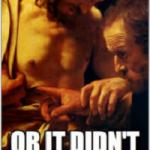As a follow-up to my post about so-called Doubting Thomas and the story about him in the Gospel of John, it is perhaps worth pointing out that the very same thing that is said about Thomas, almost in every detail, is said about the rest of the Twelve. Luke 24:1-12 says:
On the first day of the week, at early dawn, they went to the tomb, taking the spices that they had prepared. They found the stone rolled away from the tomb, but when they went in they did not find the body. While they were perplexed about this, suddenly two men in dazzling clothes stood beside them. The women were terrified and bowed their faces to the ground, but the men said to them, “Why do you look for the living among the dead? He is not here but has risen. Remember how he told you, while he was still in Galilee, that the Son of Man must be handed over to the hands of sinners and be crucified and on the third day rise again.” Then they remembered his words, and returning from the tomb they told all this to the eleven and to all the rest. Now it was Mary Magdalene, Joanna, Mary the mother of James, and the other women with them who told this to the apostles. But these words seemed to them an idle tale, and they did not believe them. But Peter got up and ran to the tomb; stooping and looking in, he saw the linen cloths by themselves; then he went home, amazed at what had happened.
My question is this: why, when we have a group of women having the kind of experience that the disciples are described as having in John 20, and the eleven male apostles responding to them the way Thomas responded, do we not label all the apostles as “doubting” the way we do Thomas? Why, for that matter, is the assumption made by readers of the Gospel of John that “the disciples” included only men. While the Gospels do sometimes speak of the twelve disciples, the group known as the Twelve were not the only disciples, by any means. They weren’t even the only apostles for that matter. The sexism in how these stories are interpreted often flies under the radar, because it is so common and so taken for granted in Christian communities. It needs to be noticed, and it needs to be challenged rather than perpetuated.
Let me also mention, since it came up in a discussion recently on Facebook, that the Gospels contain some contradictory details in their stories about the days after the crucifixion. In Mark and Matthew the disciples will see Jesus in Galilee. In Luke, that promise is reworded to remind them of what Jesus said in Galilee, and they see him in Jerusalem. The Gospel of John also depicts the experience of seeing Jesus as occurring in Jerusalem, then adds in chapter 21 a story that is likely the one with which the Gospel of Mark continued. The women, according to Mark, said nothing to anyone because they were afraid. The disciples fled back to Galilee and didn’t get the reminder to expect to see Jesus there. The story that followed was presumably about an unexpected encounter by the lake. (See my article in Bible and Interpretation for more on this).
For those who missed it and want to hear it, here is my appearance on Frank Morano’s radio show The Other Side of Midnight in which we discuss the historical evidence for Jesus. He starts with an audio clip of a scene from The Chosen which I like in some ways, and yet which reflects yet another example of sexist biblical interpretation, namely the assumption that the Samaritan woman with whom Jesus had a conversation in the story in John 4 was a woman with a bad reputation, rather than a tragic figure who had been widowed multiple times. See my book What Jesus Learned from Women for more on that topic.














